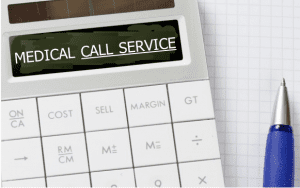
What Affects the Price of Medical Call Services and How to Get a Discount
When most healthcare providers reach out to me about medical answering services, the first question is almost always about price. And it’s a fair one—especially in an industry where every dollar spent needs to support both operational efficiency and patient care.
But the cost of a medical call service isn’t as simple as a flat monthly fee. There are multiple factors that influence how much a provider will pay, and just as many ways to lower those costs without compromising quality or compliance.
After 20 years in this industry, I’ve helped countless practices—ranging from solo physicians to large urgent care services—understand what drives pricing and where they can unlock real savings. Let’s break it down.
1. Call Volume and Usage Patterns
This is the single biggest driver of cost. Most answering service plans are based on either:
-
Per-minute billing, where you’re charged for the time agents spend on the phone with your callers, or
-
Per-call billing, where each individual interaction has a fixed fee.
High-volume practices or those with lots of after-hours calls will naturally pay more, especially if you require live agents 24/7. Even minor call increases—like a flu season spike—can shift your monthly invoice significantly.
Discount tip: If your call patterns are predictable, ask about bundled or tiered pricing plans. Many call services offer volume-based discounts when you commit to a higher number of minutes or calls per month.
2. Hours of Coverage
Do you need support only after 5 p.m.? Or do you require full 24/7 coverage, including weekends and holidays?
Extended coverage comes with higher labor costs, especially for overnight shifts or holidays. However, some services offer shared agent pools, which are more affordable than dedicated agents. Just know that shared agents may juggle multiple clients, which can affect wait times or brand personalization.
Discount tip: If you don’t need true 24/7 coverage, opt for a hybrid model—daytime overflow only or weekends only. That kind of focused scheduling can shave hundreds off your monthly bill.

3. Specialized Medical Requirements
Medical call services aren’t the same as generic answering services. We’re held to stricter standards—HIPAA compliance, agent training in medical terminology, and often protocols for nurse triage, emergency escalation, or secure messaging platforms.
These features add to your cost but are essential for liability protection and patient trust.
Discount tip: Not every office needs advanced triage or bilingual support. Review your plan line-by-line to ensure you’re not paying for features you don’t use. You might be surprised at how many practices are over-subscribed.
4. Integration With Your Systems
Some answering services offer seamless integrations with your EHR, practice management software, or on-call scheduling apps. While incredibly helpful, integrations often come with setup fees and monthly maintenance charges.
Discount tip: If integrations aren’t mission-critical, you can use secure email or app-based message delivery for less. Or, negotiate a flat setup fee instead of ongoing charges.
5. Customization and Scripting Complexity
Highly customized scripts and complex call flows—such as handling different protocols by department, provider, or patient type—take more time for agents to process, which increases billed minutes.
Discount tip: Simplify your call scripts where possible. A streamlined process reduces both agent handling time and overall cost.
6. Emergency Call Handling or Nurse Triage
Some providers need agents who can assess emergencies, handle critical calls, or even conduct basic nurse triage using clinical protocols. These services require additional licensing, liability coverage, and medical staff, which can drive pricing significantly higher.
Discount tip: If you don’t need formal triage, but want urgent call routing, ask for a basic escalation protocol—this typically costs less and still gets emergency calls to the right person fast.
7. Contract Terms and Commitment Levels
Most providers are offered month-to-month contracts at a higher rate. But longer commitments—like 6 or 12 months—often unlock lower pricing tiers.
Discount tip: Negotiate a short trial period (30-60 days) before signing a longer-term contract. Once satisfied, ask about annual billing discounts or loyalty rate locks to reduce costs over time.

How to Get a Discount on a Medical Answering Service
Now that we’ve covered the factors that drive pricing, let me share some of the best ways I’ve helped clinics and private practices reduce their answering service costs:
Ask for a Custom Quote
Don’t just go by what’s advertised on websites. Your practice’s needs are unique. A tailored quote can reveal hidden discounts or better-fit plans.
Bundle Services
If you’re already using related tools (like secure texting or appointment reminders), see if bundling can reduce your total spend across platforms.
Audit Your Current Usage
Request a usage report for the last 3–6 months. Then, compare it against what you’re actually being charged. Many clients overpay for unused minutes, agent time, or features.
Negotiate Annual Plans
As I mentioned earlier, longer-term agreements often come with price breaks. If you’ve been with a service for a while and haven’t asked for a loyalty discount, now’s the time.
Switch Providers at the Right Time
If your needs have evolved or your costs keep creeping up, get competing quotes. Newer services may offer introductory discounts, free setup, or even contract buyouts to win your business.
I’ve spent the last two decades helping healthcare providers simplify communication while lowering overhead. Medical call services aren’t one-size-fits-all—and your pricing shouldn’t be either.
When you understand what you’re paying for and where to trim the fat, you can build a smarter, more affordable call support system that keeps your practice efficient and your patients happy.
—
Written by Keith Chambers, a Princeton University graduate with a bachelor’s degree in human resource management and psychology. I’ve owned a successful medical answering service company in California for 20 years, specializing in emergency call handling, healthcare communication, and patient access solutions. I’m also a contributing writer for Medical Call Service.

Leave a Reply